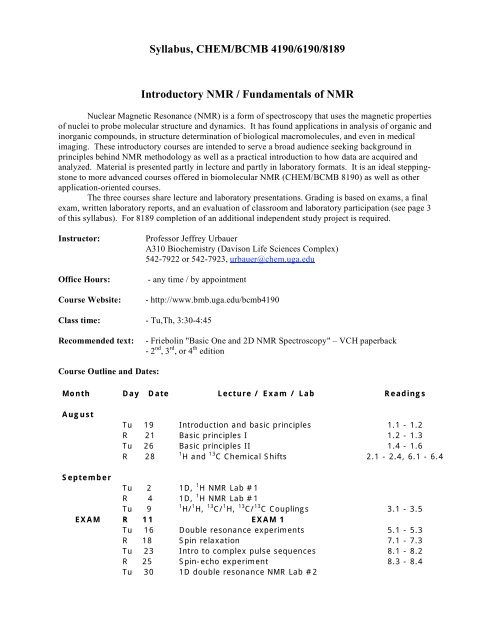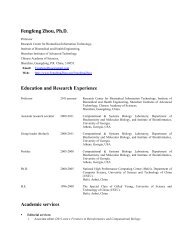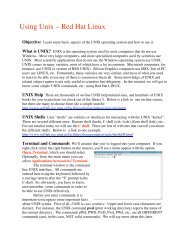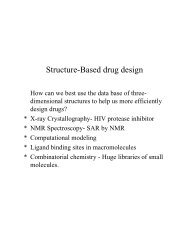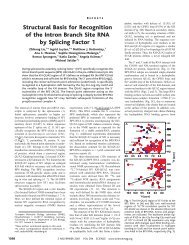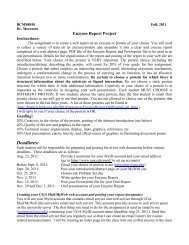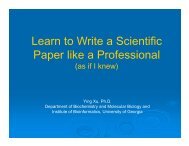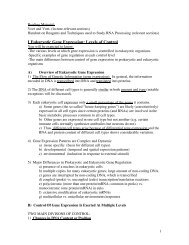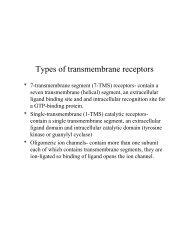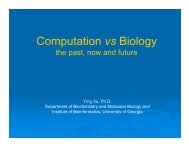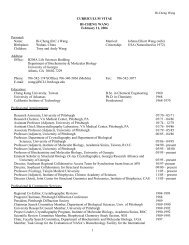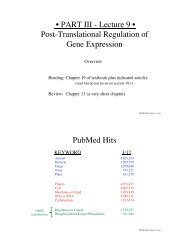Syllabus, CHEM/BCMB 4190/6190/8189 Introductory NMR ...
Syllabus, CHEM/BCMB 4190/6190/8189 Introductory NMR ...
Syllabus, CHEM/BCMB 4190/6190/8189 Introductory NMR ...
You also want an ePaper? Increase the reach of your titles
YUMPU automatically turns print PDFs into web optimized ePapers that Google loves.
<strong>Syllabus</strong>, <strong>CHEM</strong>/<strong>BCMB</strong> <strong>4190</strong>/<strong>6190</strong>/<strong>8189</strong><br />
<strong>Introductory</strong> <strong>NMR</strong> / Fundamentals of <strong>NMR</strong><br />
Nuclear Magnetic Resonance (<strong>NMR</strong>) is a form of spectroscopy that uses the magnetic properties<br />
of nuclei to probe molecular structure and dynamics. It has found applications in analysis of organic and<br />
inorganic compounds, in structure determination of biological macromolecules, and even in medical<br />
imaging. These introductory courses are intended to serve a broad audience seeking background in<br />
principles behind <strong>NMR</strong> methodology as well as a practical introduction to how data are acquired and<br />
analyzed. Material is presented partly in lecture and partly in laboratory formats. It is an ideal steppingstone<br />
to more advanced courses offered in biomolecular <strong>NMR</strong> (<strong>CHEM</strong>/<strong>BCMB</strong> 8190) as well as other<br />
application-oriented courses.<br />
The three courses share lecture and laboratory presentations. Grading is based on exams, a final<br />
exam, written laboratory reports, and an evaluation of classroom and laboratory participation (see page 3<br />
of this syllabus). For <strong>8189</strong> completion of an additional independent study project is required.<br />
Instructor:<br />
Office Hours:<br />
Course Website:<br />
Professor Jeffrey Urbauer<br />
A310 Biochemistry (Davison Life Sciences Complex)<br />
542-7922 or 542-7923, urbauer@chem.uga.edu<br />
- any time / by appointment<br />
- http://www.bmb.uga.edu/bcmb<strong>4190</strong><br />
Class time: - Tu,Th, 3:30-4:45<br />
Recommended text:<br />
- Friebolin "Basic One and 2D <strong>NMR</strong> Spectroscopy" – VCH paperback<br />
- 2 nd , 3 rd , or 4 th edition<br />
Course Outline and Dates:<br />
Month Day Date Lecture / Exam / Lab Readings<br />
August<br />
Tu 19 Introduction and basic principles 1.1 - 1.2<br />
R 21 Basic principles I 1.2 - 1.3<br />
Tu 26 Basic principles II 1.4 - 1.6<br />
R 28<br />
1 H and 13 C Chemical Shifts 2.1 - 2.4, 6.1 - 6.4<br />
September<br />
Tu 2 1D, 1 H <strong>NMR</strong> Lab #1<br />
R 4 1D, 1 H <strong>NMR</strong> Lab #1<br />
Tu 9<br />
1 H/ 1 H, 13 C/ 1 H, 13 C/ 13 C Couplings 3.1 - 3.5<br />
EXAM R 11 EXAM 1<br />
Tu 16 Double resonance experiments 5.1 - 5.3<br />
R 18 Spin relaxation 7.1 - 7.3<br />
Tu 23 Intro to complex pulse sequences 8.1 - 8.2<br />
R 25 Spin-echo experiment 8.3 - 8.4<br />
Tu 30 1D double resonance <strong>NMR</strong> Lab #2
<strong>Syllabus</strong>, <strong>CHEM</strong>/<strong>BCMB</strong> <strong>4190</strong>/<strong>6190</strong>/<strong>8189</strong><br />
October<br />
R 2 1D double resonance <strong>NMR</strong> Lab #2<br />
EXAM Tu 7 EXAM 2<br />
R 9 INEPT experiment 8.5<br />
Tu 14 DEPT experiment 8.6<br />
R 16 Intro to 2D <strong>NMR</strong> / COSY 9.1 - 9.3<br />
Tu 21 1D 13 C and DEPT <strong>NMR</strong> Lab #3<br />
R 23 1D 13 C and DEPT <strong>NMR</strong> Lab #3<br />
*** R 23 ***MIDPOINT WITHDRAWL DEADLINE***<br />
Tu 28 2D COSY / HETCOR 9.4<br />
EXAM R 30 EXAM 3<br />
November<br />
Tu 4 2D TOCSY / HSQC 9.4<br />
R 6 The Nuclear Overhauser Effect 10.1 - 10.2<br />
Tu 11 2D HSQC / COSY <strong>NMR</strong> Lab #4<br />
R 13 2D HSQC / COSY <strong>NMR</strong> Lab #4<br />
Tu 18 2D NOESY 10.2 - 10.4<br />
R 20 Special Topic<br />
Tu 25 Thanksgiving Break – no class<br />
R 27 Thanksgiving Break – no class<br />
December<br />
Tu 2 NOESY / TOCSY <strong>NMR</strong> Lab #5<br />
R 4 NOESY / TOCSY <strong>NMR</strong> Lab #5<br />
Tu 9 Friday class schedule – no class Last day of class<br />
Wed 10 Reading day<br />
EXAM Tu 16 EXAM 4 (3:30 - 6:30)<br />
ATTENDANCE:<br />
The University of Georgia guidelines for attendance state:<br />
“Students are expected to attend classes regularly. A student who incurs an excessive number of absences<br />
may be withdrawn from a class at the discretion of the professor”<br />
(http://bulletin.uga.edu/bulletin/ind/attendance.html).<br />
Attendance in this course will be monitored. For this course, five (5) absences from lectures will<br />
result in automatic withdrawl from the course. If the withdrawl is before the midpoint deadline, the grade<br />
will be “W”. After the deadline, the grade will be “F”. The five (5) absences include absences that may<br />
prove to be excused.<br />
No absences from laboratory periods are permitted. A missed laboratory period will result in a<br />
score of zero (0) for that laboratory (see below).<br />
No absences from exam periods are permitted. A missed exam will result in a score of zero (0)<br />
for that exam (see below).<br />
Examinations missed in the case of emergencies, including personal/family crises, require a<br />
signed excuse from the Office of the Vice President of Instruction. No score for a makeup exam will be<br />
acknowledged/recorded without this signed excuse.
<strong>Syllabus</strong>, <strong>CHEM</strong>/<strong>BCMB</strong> <strong>4190</strong>/<strong>6190</strong>/<strong>8189</strong><br />
Examinations missed in the case of personal illness require certification signed by the attending<br />
physician describing the illness and validating the absence. This will be presented to the instructor.<br />
Contact information for the attending physician will also be provided to the instructor.<br />
In the event that a critical activity has been scheduled well in advance of a scheduled exam, the<br />
student can arrange with the instructor for a makeup exam. This must be done at least two weeks before<br />
the examination. In the event it is not, a signed excuse from the Office of the Vice President of<br />
Instruction must be provided.<br />
Makeup exams will be given only within four (4) days of the normally scheduled exam. These<br />
will be scheduled at the earliest possible time.<br />
The same guidelines for missed exams apply to missed laboratory sessions (see below).<br />
Lectures begin at 3:30. Students who arrive between 3:30 and 3:40 will be considered late. Two<br />
(2) such instances of arriving late will constitute one (1) absence. Students who arrive after 3:40 will be<br />
considered absent.<br />
ELECTRONIC DEVICES:<br />
No laptops, cell phones, ipods or other electronic devices are allowed to be in operation in the<br />
classroom. All such, or related, devices must be turned off before entering the classroom. The exception<br />
is, for exams, each student should bring a hand-held calculator to each exam. PDAs are not allowed.<br />
GRADING:<br />
Grades will be based on exams and written laboratory reports. There are three (3) in-class exams<br />
and one (1) final exam, for a total of four (4) exams. There are five (5) laboratory sessions and a total of<br />
five (5) written laboratory reports. The grade in the course will be assigned based on the highest three (3)<br />
exam scores and the highest four (4) written laboratory report scores. The three (3) highest exam scores<br />
will count 75% toward the final grade, and the four (4) highest laboratory scores will count 25% toward<br />
the final grade.<br />
Consideration for regrading of an exam requires that the student request the regrading no more<br />
than one (1) week after the graded exam is returned. A written statement detailing the justification for<br />
consideration of regrading must also be provided.<br />
EXAMS:<br />
There are three (3) in class exams and one (1) final exam for a total of four (4) exams. All exams<br />
are comprehensive. The length of the final exam will be similar to the in class exams, but students will<br />
have the full examination time (approximately three hours) to answer the questions. The final exam does<br />
not count more towards the final grade than the in class exams. An absence from an exam will result in a<br />
score of zero (0) for that exam.<br />
Exams will cover all material discussed in class, all material found in the lecture notes, and all<br />
material in the reading assignments.<br />
LABORATORY / WRITTEN LABORATORY REPORTS:<br />
There are five (5) laboratory sessions and a total of five (5) written laboratory reports. A written<br />
report is required for each lab. These are generally due one (1) week after the scheduled laboratory<br />
period. An absence from a laboratory session will result in a score of zero (0) for that lab/report.


